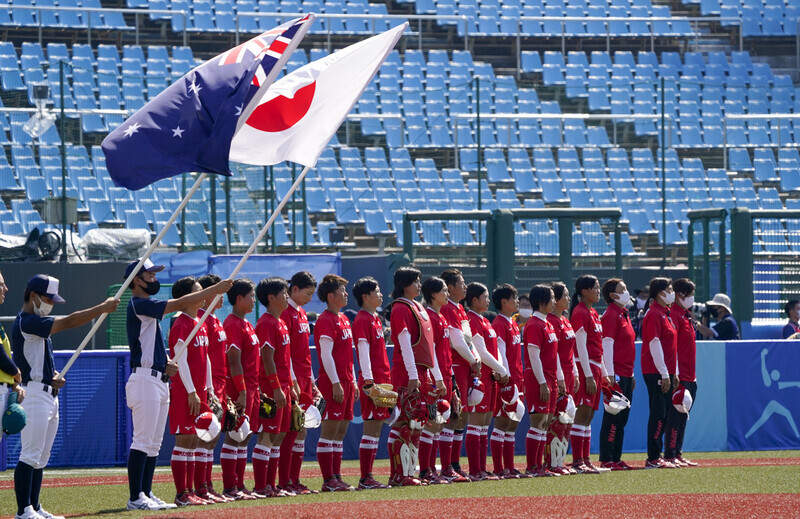hankyoreh
Links to other country sites 다른 나라 사이트 링크
[Reporter’s notebook] “Recovery Olympics” doesn’t really serve Fukushima’s interests

The Tokyo Olympics kicked off Wednesday with a game between the Australian and Japanese women’s softball teams. The game, the first of this year’s Olympics, was held at Fukushima Azuma Baseball Stadium.
The softball game was particularly important for Japan, which has dubbed this year’s games the “Recovery Olympics,” since it shows the whole world that Japan has rebuilt Fukushima, severely damaged by the 2011 Tohoku earthquake, tsunami, and subsequent nuclear disaster.
The International Olympic Committee (IOC) appears to be on board with the Japanese government’s plan. Rumor has it that IOC President Thomas Bach might even throw the first pitch at a baseball game between Japan and the Dominican Republic in the same stadium on Wednesday.
As the Japanese public turns against the games, Tokyo and the IOC seem determined to use the Fukushima issue to assuage public anger.
Japan has even set up a promotional booth for the “Recovery Olympics” at the Main Press Center for the Olympics, where reporters from around the world are gathering. The booth is decorated with wooden chairs made in Fukushima and flowers from the prefectures affected by the disaster: Fukushima, Miyagi, and Iwate.
“The flowers from affected regions will be used in Olympic bouquets, and agricultural products will be provided to the Olympic Village,” a staff member at the booth said on Tuesday.

Produce from Fukushima has become a source of conflict between South Korea and Japan. The Japanese government objected to the Korean Sport & Olympic Committee (KSOC) decision to provide Korean athletes with its own meals.
Japan’s Liberal Democratic Party vociferously objected that KSOC’s plan is “causing pain to the residents of the affected areas.” I can’t shake the feeling that Japan is trying to exploit the aftermath of the disaster for political ends by redirecting Japanese anxiety about the Olympics against the outside world.
A clip from Japan’s NHK broadcaster went viral in Korea at the beginning of this month. In the clip, NHK anchor Kana Nakayama was interviewing someone about a landslide in Shizuoka Prefecture on July 3 when she realized the interviewee wasn’t in a safe location. She immediately halted the interview and asked the interviewee to take shelter.
I’m often impressed to see the Japanese calmly reading a disaster announcement right after an earthquake takes place. It’s wonderful to see people in a crisis situation dutifully going about their assigned roles in a principled manner.
But the Japanese government’s behavior during a disaster situation has been far from that sort of principled response. Rather than checking for the possibility of radiation after the earthquake and nuclear accident, the government rushed forward with a campaign to support affected areas by eating their produce, which only exacerbated fears.
A more recent example was Japan’s decision to release radioactive water from the Fukushima nuclear plant into the ocean. The Japanese public is sharply divided on the decision, and residents of the Tohoku Region, including Fukushima, have expressed their opposition to releasing the contaminated water. Residents don’t trust the government’s decision, which they’re worried might set Fukushima back a decade.
The Tohoku earthquake was a tragedy not only for Japan but also for all of humanity. People of all nationalities want recovery for the affected regions and the people living there.
I’m just not sure whether softball matches, Thomas Bach’s first pitch, the promotional booth for the “Recovery Olympics” and the Japanese government’s repetitive appeals to “just trust us” are very helpful.
“We’re working hard for Fukushima’s recovery, but we don’t know how we’ll be helped by the Olympic Games in Tokyo,” a skeptical Fukushima farmer was quoted as saying in the Japanese media.
I wonder how long the Japanese government will shut its ears to domestic and international public opinion.
By Lee Jun-hee, staff reporter
Please direct comments or questions to [english@hani.co.kr]

Editorial・opinion
![[Column] Season 2 of special prosecutor probe may be coming to Korea soon [Column] Season 2 of special prosecutor probe may be coming to Korea soon](https://flexible.img.hani.co.kr/flexible/normal/500/300/imgdb/original/2024/0426/3317141030699447.jpg) [Column] Season 2 of special prosecutor probe may be coming to Korea soon
[Column] Season 2 of special prosecutor probe may be coming to Korea soon![[Column] Park Geun-hye déjà vu in Yoon Suk-yeol [Column] Park Geun-hye déjà vu in Yoon Suk-yeol](https://flexible.img.hani.co.kr/flexible/normal/500/300/imgdb/original/2024/0424/651713945113788.jpg) [Column] Park Geun-hye déjà vu in Yoon Suk-yeol
[Column] Park Geun-hye déjà vu in Yoon Suk-yeol- [Editorial] New weight of N. Korea’s nuclear threats makes dialogue all the more urgent
- [Guest essay] The real reason Korea’s new right wants to dub Rhee a founding father
- [Column] ‘Choson’: Is it time we start referring to N. Korea in its own terms?
- [Editorial] Japan’s rewriting of history with Korea has gone too far
- [Column] The president’s questionable capacity for dialogue
- [Column] Are chaebol firms just pizza pies for families to divvy up as they please?
- [Column] Has Korea, too, crossed the Rubicon on China?
- [Correspondent’s column] In Japan’s alliance with US, echoes of its past alliances with UK
Most viewed articles
- 1After election rout, Yoon’s left with 3 choices for dealing with the opposition
- 2AI is catching up with humans at a ‘shocking’ rate
- 3Noting shared ‘values,’ Korea hints at passport-free travel with Japan
- 4Two factors that’ll decide if Korea’s economy keeps on its upward trend
- 5Why Kim Jong-un is scrapping the term ‘Day of the Sun’ and toning down fanfare for predecessors
- 6South Korea officially an aged society just 17 years after becoming aging society
- 7Korea’s 1.3% growth in Q1 signals ‘textbook’ return to growth, says government
- 8Is Japan about to snatch control of Line messenger from Korea’s Naver?
- 91 in 5 unwed Korean women want child-free life, study shows
- 10[Reportage] On US campuses, student risk arrest as they call for divestment from Israel